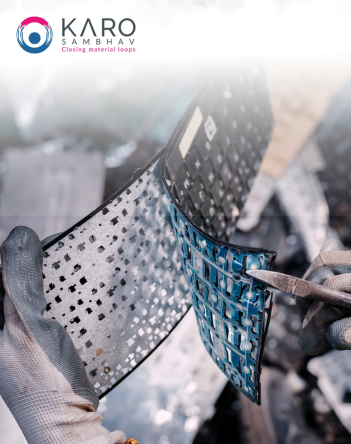Karo Sambhav collaborates with leading organisations to jointly develop industry frameworks, standards, governance mechanisms, systems and processes that advance the transition to circular economy. know more about our alliances.
How often have you heard about the importance of waste management? It is no secret that irresponsible waste disposal is a prime cause of environmental pollution. Besides, it is a major loss of resources that are valuable and not infinite in nature. Did you know that waste piling in landfills is abundant with toxic chemicals and heavy metals? These chemicals leach into the environment and aggravate the release of toxic greenhouse gases. The gases naturally deplete the air quality and endanger human health by large. Thus, it is safe to conclude that improper disposal of waste has severe ramifications.
Also, rapidly growing industrialisation caters to the aggravating environmental crisis. This is quite evident in the expanding size of landfills. Hence, the need for an environmental protection strategy is pivotal for the present times.
EPR, or 'Extended Producer Responsibility', is a well-thought environmental protection strategy. The policy has been made mandatory in India, owing to the exponentially rising waste and awful environmental impact. Are you curious to find out what EPR is all about? It is the only proven environmental policy in which a producer is responsible for the collection, channelisation, treatment, and disposal of waste. Let's explain a little more about EPR.
Industrial waste is an alarming environmental concern. Also, did you know that India ranks 3rd as the top producer of electronic waste worldwide? Well, the environmental policy or EPR audit puts a monitoring system in place that directs producers, manufacturers, and entrepreneurs to accumulate all created and end-of-use products for recycling and proper disposal. Little do you know that there are multiple facets to EPR. Wondering what? Let's read:
In short, extended producer responsibility defines a producer's responsibility for products beyond its factory gates. It holds producers responsible for the take-back of end-of-life products.
Before we start, do you know what is EPR authorization? It is a responsibility vested with producers and importers to properly treat, dispose of, and recycle post-consumer goods. Simply put, EPR authorization defines an environmental and economical approach to monitoring and managing a product's lifecycle. Besides, EPR authorization encourages the systemic recycling of products to reduce the surging volumes of waste.
Normally, EPR authorization is compulsory for producers, manufacturers, and importers of e-waste, plastic waste, battery waste, tyre waste, etc. According to the compliance, producers are not only responsible for the products used and discarded by the consumer but design an environmentally-sound collection or take-back system to channelise waste.
A producer may choose to implement EPR, either individually or collectively. Need a little more insight? Let's read:
Individual producer responsibility – IPR is when producers exercise EPR to manage the environmental and social impact of waste solely by themselves. The process demands producers set up their own authorized collection centres.
Collective producers' responsibility – EPR programmes might appear deceptively simple. However, the regulations are quite demanding and involve complex processes such as a thorough EPR audit and reporting the quantities of recycling waste that is re-processed into high-quality and valuable secondary resources. Thus, PIBOs or producers, importers, and brand owners may choose to authorize common collection centres (CCC) to accumulate and treat waste or join in as a member of an association.
In a nutshell, PIBOs might manage the system individually or associate with a professional PRO (Public Responsibility Organisation) to collect and channelise waste by involving numerous stakeholders like bulk consumers, the informal sector, retailers, NGOs, dealers, and more. Speaking of well-known PROs, the organisation that has been setting the benchmark in executing an environmentally-sound waste management system is Karo Sambhav. The PRO performs EPR audit, strategise EPR compliance plans, and does everything to keep companies and PIBOs lawfully compliant with the EPR regulations.
Wondering what an EPR audit is all about? It is a real-time inspection of the groundwork of waste collection and processing performed by the stakeholders. Simply put, an audit report helps the government evaluate if PIBOs and stakeholders working within the established limits adhere to the standards pre-set by the CPCB or Central Pollution Control Board or the State Pollution Control Boards.
In addition to EPR authorization, an EPR certificate is quintessential for manufacturers and importers of waste. Applying for an EPR certificate is mandatory and requires the following documents:
1. GST certificate of the manufacturer
2. Address of the manufacturing unit
3. Copy of certificates and documents of the company registrar or the Directorate of the company
4. Self-declaration for the compliance of RoHS (Restriction of Hazardous Substances) standards
5. Address proof of the manufacturers/importers.
6. Duplicate copies of the licences and permissions sanctioned by the relevant ministry and departments to operate a business. These documents include:
7. All necessary documents related to the proposed EPR plan
8. Relevant documents of the EPR plan
9. The estimated budget earmarked for the proposed EPR plan
10. Details of the allied awareness initiatives.
Once the documents are received, the CPCB evaluates the documents provided, verifies the application, and grants EPR authorization to the manufacturer or importer in a span of 120 days. In case an application is incomplete, the Central Pollution Control Board might provide a checklist of the documents in 25 days and ask PIBOs to furnish the same.
So, now you are aware of the importance of EPR compliance. It is an environmental approach to prevent waste, proceed with proper disposal of waste, and reinforce and popularise system recycling of products.
Karo Sambhav collaborates with leading organisations to jointly develop industry frameworks, standards, governance mechanisms, systems and processes that advance the transition to circular economy. know more about our alliances.





